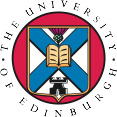Mathematical Physics at the University of Edinburgh



In subsequent years we offer a core programme of Mathematical Physics, consisting of a series of increasingly advanced courses in relativity, electrodynamics, quantum mechanics, and statistical mechanics, together with computing and project work. Alongside this our students can choose from a very wide range of optional courses: in cosmology, particle physics, nuclear physics, astrophysics, atomic physics, condensed matter physics, critical phenomena, computational physics, experimental laboratory, algebra, geometry, pure and applied analysis, numerical simulation, financial mathematics, and teaching experience. Students on the MPhys programme then develop their understanding of one of these areas in greater depth through our final year project.
Every year we award the Tait Medal for the best final year student in Mathematical Physics or Mathematics & Physics.
Andrea Thamm (in the picture) is the 2010 medalist.
In the School of Physics we offer a four year Mathematical Physics integrated master’s (MPhys) degree, as well as a three year BSc degree in Mathematical Physics. Both these degree programmes have a 'Broad Track' option of an extra preliminary year (making them into five and four year programmes respectively), intended primarily for Scottish students with only Highers qualifications. There is also a Foundation Year programme for students from outside the EU. Better qualified students may skip the first year, entering directly into year two (Fast Track). Entrance qualifications may be found here.
Mathematics is the language of physics, and a thorough understanding is impossible without a firm foundation in mathematics. The first year (or two years for Broad Track students) of all our degree programmes focuses on laying this foundation, with courses on abstract and linear algebra, multivariate and vector calculus, real analysis and probability, alongside courses in classical dynamics, electromagnetism, and introductory quantum mechanics. This programme is broad enough that Mathematical Physics students can if they wish switch to either a Physics degree, or a Mathematics degree: we understand that as your career develops, so will your understanding of your own interests and abilities.

